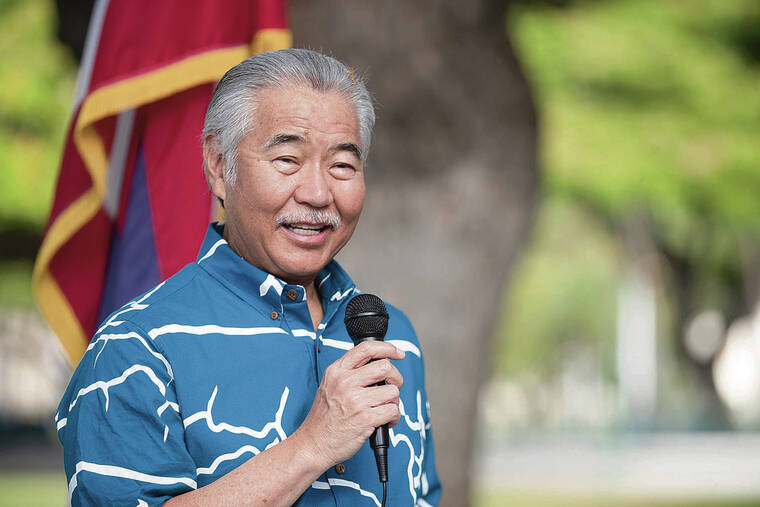Gov. David Ige on Monday gave Hawaii’s Legislature a long list of bills he might veto, including measures dealing with bail reform, $60 million in Hawaii Tourism Authority funding and a vaping products ban.
Also on the list are bills aiming to limit sources of renewable energy on each island, preserve video archives of public agency meetings, amend high school graduation requirements, extend state agriculture park leases and allow the Legislature to terminate a state of emergency declared by a governor.
In all, Ige listed 30 bills he called problematic or downright bad, setting a record for himself during his eight years as the state’s chief executive.
The governor, who will leave office in December, has until July 12 to deliver actual vetoes to the Legislature.
Ige does not have to veto every bill on his intent list, but on Monday he identified two bills that he said he definitely will.
One is House Bill 1570, which would ban sales of certain flavored tobacco products to reduce youth vaping. Ige said a late amendment to the bill during the legislative session will allow hundreds if not thousands of vaping products to still be sold.
“This amendment renders the bill effectively useless and is counter to the bill’s original intent,” he said, adding that he could not find an advocate who wants him to sign the bill.
Another bill Ige found highly flawed is Senate Bill 2510, which aims to cap the amount of electricity produced from the sun, wind or other intermittent renewable energy source on any island at 45%, excluding geothermal energy. This bill also would require that at least 33% of renewable energy be produced by sources that are not intermittent, such as biomass and trash.
Ige called the bill a mandate that would derail planned renewable energy projects and prevent the state from achieving its goal to produce 100% of electricity from renewable sources by 2045.
For example, he said the bill would prevent development of a solar energy project connected with batteries on Lanai that would bring the island’s renewable energy production to 98% while reducing the average consumer electricity bill by $130 a month.
“This bill would prevent that from happening,” he said. “We shouldn’t waste our time on this kind of legislation if we hope to exist in a clean-energy future.”
Another highly controversial bill on Ige’s list would eliminate the ability of judges to require that people charged with many lower-level nonviolent offenses post cash bail to get out of jail before their case is adjudicated.
Ige said he supports bail reform but not the way it’s programmed in HB 1567. The governor said several concerns expressed over the bill, including the release of people who could endanger public safety, were not adequately addressed. Ige also said the introducer of the bill, Rep. Scot Matayoshi (D, Kaneohe-Maunawili-Kailua), supports the bill’s veto in an unprecedented move during Ige’s time as governor.
A few targets of potential vetoes have to do with budgetary appropriations. Ige said he might veto specific appropriations in the budget bill, HB 1600, but did not identify which things he might line-item veto for reasons that include appropriating more than $100 million in federal funding that he said is not allowed.
One bill related to the state budget, HB 1147, appropriates $60 million for HTA as well as $28.5 million for Hawai‘i Convention Center operations. This funding was inserted into the bill at the end of the legislative session with no opportunity for public input, which Ige called an unconstitutional move given a Hawaii Supreme Court ruling in 2021 that addressed a previous example of a bill that had been gutted and replaced in violation of the state Constitution that requires a bill with its original principal or relevant amended content to receive public readings.
A law enacted from such a “gut and replace” bill could be challenged in court and struck down.
“I know some have suggested that I just let it go and see what happens, but I do believe it was an egregious violation of the gut-and-replace ruling,” Ige said.
The governor said he is exploring other ways to fund HTA operations.
One highly debated bill not on the governor’s list would establish a new authority to manage Mauna Kea in place of the University of Hawaii. This bill, HB 2024, produced concerns from the state Department of Land and Natural Resources and others, but Ige said some change was needed for future stewardship of the mountaintop where the operation of astronomy observatories has clashed with many Native Hawaiians, who say such use desecrates a sacred place.
“This is not a perfect solution,” Ige acknowledged.
Members of the state Senate and House of Representatives intend to meet to determine whether they will call a special session in which they can override any vetoed bills with two- thirds-majority votes before noon July 12.
In 2021 the Legislature overrode six vetoed bills that became law, including one measure that affected HTA funding.
In Ige’s first six years as governor, lawmakers overrode only one veto, which occurred in 2016.
This is the second year in a row when Ige has produced a long veto intention list, compared with prior years that included four years with between seven and 11 bills listed.
In 2021, Ige listed 28 bills, of which he vetoed 26, partly because federal aid spending guidance was received after the session ended and partly because some budgetary cutbacks weren’t needed after state revenues improved while the 2021 Legislature was in session.
Other governors have vetoed considerably more bills than Ige did in 2021 and is considering this year. For instance, Gov. Ben Cayetano vetoed 42 bills in 2000, and Gov. Linda Lingle vetoed 57 bills in 2008.
The Legislature this year passed 343 bills. So far, Ige has signed 229 bills, including 105 on Monday.
In Ige’s sights
>> To see all the bills on the governor’s veto intent list, visit 808ne.ws/vetointent Opens in a new tab.




